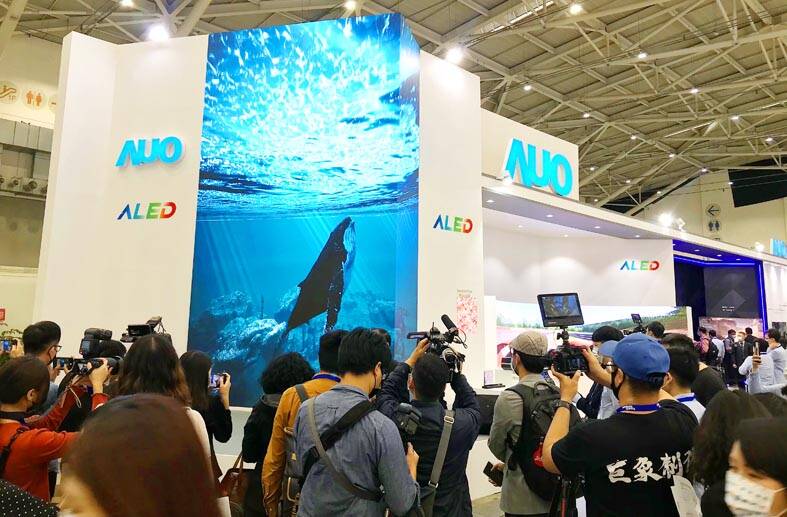Flat-panel maker AUO Corp (友達) plans to retire an older, less competitive plant in Taoyuan, which produces panels used in notebook computers and monitors, to enhance the company’s operational efficiency, it said yesterday.
AUO plans to allocate manufacturing capacity at the factory, named the 5A Fab, in the city’s Longtan District (龍潭) to the company’s other plants, it said in a statement.
It is not shutting down the plant, but would better utilize the facility for new products and new technologies to cater to market demand, it said, adding that new technologies and products usually deliver better margins.

Photo: Chen Mei-ying, Taipei Times
The 5A Fab is a fifth-generation plant with an installed capacity of 62,000 units a month, AUO said.
The facility primarily produces notebook computers and monitor panels as well as some touch panels, it said.
Plant employees would be relocated to other manufacturing sites this year, it said.
The Hsinchu-based panel maker has been broadening its business beyond commodity panels used in TVs and PCs, diversifying into non-panel businesses to escape the “crystal cycle” of the past few years.
AUO is expanding into high-margin panels such as those used in vehicles, medical devices and industrial devices, it said.
The company also expanded into other sectors, such as solar power plant construction and water recycling solutions.
AUO’s non-panel businesses accounted for 10 percent of the company’s total revenue last year, it said.
Local peer Innolux Corp (群創) yesterday also said it did not rule out making similar changes.
Innolux would only allocate manufacturing capacity for the purpose of improving the company’s operational efficiency and sustainable growth, it said.
Such changes would only be pursued when the interests of its employees and stakeholders are ensured, it added.

SEEKING CLARITY: Washington should not adopt measures that create uncertainties for ‘existing semiconductor investments,’ TSMC said referring to its US$165 billion in the US Taiwan Semiconductor Manufacturing Co (TSMC, 台積電) told the US that any future tariffs on Taiwanese semiconductors could reduce demand for chips and derail its pledge to increase its investment in Arizona. “New import restrictions could jeopardize current US leadership in the competitive technology industry and create uncertainties for many committed semiconductor capital projects in the US, including TSMC Arizona’s significant investment plan in Phoenix,” the chipmaker wrote in a letter to the US Department of Commerce. TSMC issued the warning in response to a solicitation for comments by the department on a possible tariff on semiconductor imports by US President Donald Trump’s

‘FAILED EXPORT CONTROLS’: Jensen Huang said that Washington should maximize the speed of AI diffusion, because not doing so would give competitors an advantage Nvidia Corp cofounder and chief executive officer Jensen Huang (黃仁勳) yesterday criticized the US government’s restrictions on exports of artificial intelligence (AI) chips to China, saying that the policy was a failure and would only spur China to accelerate AI development. The export controls gave China the spirit, motivation and government support to accelerate AI development, Huang told reporters at the Computex trade show in Taipei. The competition in China is already intense, given its strong software capabilities, extensive technology ecosystems and work efficiency, he said. “All in all, the export controls were a failure. The facts would suggest it,” he said. “The US

The government has launched a three-pronged strategy to attract local and international talent, aiming to position Taiwan as a new global hub following Nvidia Corp’s announcement that it has chosen Taipei as the site of its Taiwan headquarters. Nvidia cofounder and CEO Jensen Huang (黃仁勳) on Monday last week announced during his keynote speech at the Computex trade show in Taipei that the Nvidia Constellation, the company’s planned Taiwan headquarters, would be located in the Beitou-Shilin Technology Park (北投士林科技園區) in Taipei. Huang’s decision to establish a base in Taiwan is “primarily due to Taiwan’s talent pool and its strength in the semiconductor

French President Emmanuel Macron has expressed gratitude to Hon Hai Precision Industry Co (鴻海精密) for its plan to invest approximately 250 million euros (US$278 million) in a joint venture in France focused on the semiconductor and space industries. On his official X account on Tuesday, Macron thanked Hon Hai, also known globally as Foxconn Technology Group (富士康科技集團), for its investment projects announced at Choose France, a flagship economic summit held on Monday to attract foreign investment. In the post, Macron included a GIF displaying the national flag of the Republic of China (Taiwan), as he did for other foreign investors, including China-based